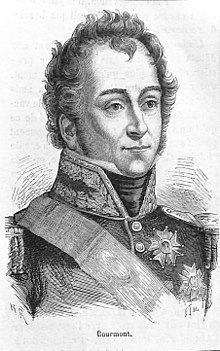
Back دي بورمن Arabic دى بورمن ARZ Louis-Auguste-Victor de Ghaisnes de Bourmont Czech Louis-Auguste-Victor de Ghaisnes de Bourmont German Louis-Auguste-Victor, Conde de Ghaisnes de Bourmont Spanish Louis Auguste Victor de Ghaisne de Bourmont French Louis Auguste Victor de Ghaisne de Bourmont Italian Louis Auguste Victor de Ghaisne de Bourmont Polish Louis Auguste Victor de Ghaisne de Bourmont Portuguese Ген де Бурмон, Луи Огюст Виктор де Russian
Louis-Auguste-Victor, Count de Ghaisnes de Bourmont | |
|---|---|
 Louis-Auguste-Victor, Count de Ghaisnes de Bourmont | |
| Born | 2 September 1773 Freigné, Kingdom of France |
| Died | 27 October 1846 (aged 73) Freigné, France |
| Allegiance | |
| Service/ | Staff |
| Years of service | 1789–1800, 1807–1830, 1832–1834 |
| Rank | Marshal of France |
| Battles/wars | French Revolutionary Wars Napoleonic Wars Spanish expedition (1823) Shipwreck of Dellys (1830) Invasion of Algiers in 1830 Liberal Wars |
| Other work | Minister of War |
Louis-Auguste-Victor, Count de Ghaisnes de Bourmont (2 September 1773 – 27 October 1846) was a French general, diplomat and statesman who was named Marshal of France in 1830. A lifelong royalist, he emigrated from France soon after the outbreak of the French Revolution and fought with the counter-revolutionary Army of Condé for two years, then joined the insurrection in France for three more years before going into exile. He was arrested after assisting the Georges Cadoudal conspiracy, but escaped to Portugal.
In 1807 he took advantage of an amnesty to rejoin the French army and served in several campaigns until 1814. He rose in rank to become a general of division. During this period, he was suspected of being an agent of the Comte d'Artois and passing information to France's enemies. Though he was notoriously anti-Napoleon and many officers did not trust him, he was employed again during the Hundred Days. Immediately after the campaign began, he deserted to the Prussian army with Napoleon's plans. King Louis XVIII of France gave him a command in the Spanish expedition of 1823.
Promoted to Marshal of France, he was put in command of the Invasion of Algiers in 1830. However, after the July Revolution, he refused to recognize King Louis-Philippe of France and was sacked. After being involved in a plot against the new government, he fled to Portugal in 1832. He led the army of Dom Miguel in the Liberal Wars, and when the liberals won, he fled to Rome. He accepted another amnesty, this time in 1840, and died in France six years later.
© MMXXIII Rich X Search. We shall prevail. All rights reserved. Rich X Search